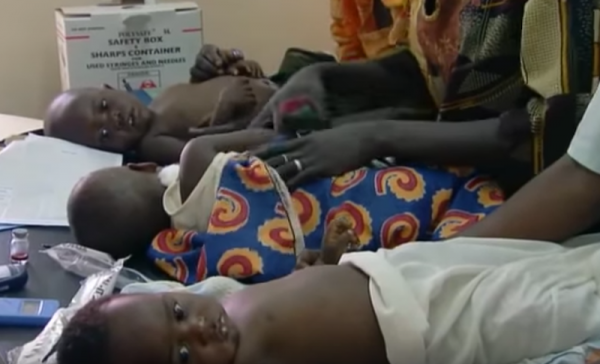By Vishal Goel, | January 25, 2017

Pneumonia kills half a million children under five in sub-Saharan Africa every year, according to UNICEF. (YouTube)
Engineers in Uganda have invented a "smart jacket" which, according to them, can diagnose pneumonia up to three times faster than a doctor. The inbuilt sensors in the biomedical jacket can pick up sound patterns from the lungs, breathing rate and body temperature and then use the processed information to estimate the strength of the disease.
Like Us on Facebook
The inspiration for the idea
When Ugandan graduate Brian Turyabagye's friend's grandmother fell seriously ill, he accompanied her to hospital where he watched doctors diagnosing malaria and prescribing various treatments accordingly. But their diagnosis came out to be wrong because she was later found out to be suffering from pneumonia. Turyabagye, 24, shocked by the circumstances and her death from pneumonia, began researching methods of diagnosing pneumonia and its treatments. He found out that the illness affects children far more than it does adults and that pneumonia kills half a million children under five in sub-Saharan Africa every year, according to UNICEF.
Problems surrounding pneumonia diagnosis
- Misdiagnosis - According to Turyabagye, many deaths are caused by misdiagnosis. In the villages and remote areas, when children get sick, the first reaction is to treat them for malaria. However, the symptoms of malaria and pneumonia are very similar.
- Unavailability of correct treatment - Even when a correct diagnosis is made, treatment is often unavailable. According to the Uganda Paediatrics Association, fewer than 20 percent of children with pneumonia receive antibiotics that cost less than $1.
Therefore, Turyabagye came up with the idea of designing the biomedical smart jacket called "Mamaope" (or mother's hope). The jacker distinguishes the symptoms of pneumonia such as temperature, breathing rate, and the sound of the lungs and eliminates the consequences of human error.
A prototype of the jacket will undergo an official national medical examination in January and certification for its use in health centers and hospitals is expected by Spring.
-
Use of Coronavirus Pandemic Drones Raises Privacy Concerns: Drones Spread Fear, Local Officials Say

-
Coronavirus Hampers The Delivery Of Lockheed Martin F-35 Stealth Fighters For 2020

-
Instagram Speeds Up Plans to Add Account Memorialization Feature Due to COVID-19 Deaths

-
NASA: Perseverance Plans to Bring 'Mars Rock' to Earth in 2031

-
600 Dead And 3,000 In The Hospital as Iranians Believed Drinking High-Concentrations of Alcohol Can Cure The Coronavirus

-
600 Dead And 3,000 In The Hospital as Iranians Believed Drinking High-Concentrations of Alcohol Can Cure The Coronavirus

-
COVID-19: Doctors, Nurses Use Virtual Reality to Learn New Skills in Treating Coronavirus Patients












